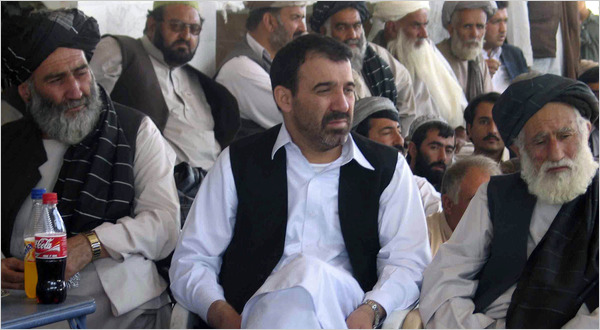By
DEXTER FILKINS New York Times
March 31, 2010


But Mr. Karzai is also the brother of the Afghan president, Hamid. And after
debating Ahmed Wali’s future for months — and with a huge military operation in
the area looming — Afghan and American officials have decided that the
president’s brother will be allowed to stay in place.
Over the last several months, President Karzai has turned down repeated requests
by both the American ambassador and the top American commander to move Ahmed
Wali Karzai out of
Senior American officials spent months weighing the allegations against Ahmed
Wali Karzai: that he pays off Taliban insurgents, that he launders money, that
he seizes land, that he reaps enormous profits by facilitating the shipment of
opium through the area. And the officials concluded that the evidence, some
compelling, some circumstantial, was not clear enough to persuade the president
to move his brother out of town, two
NATO officials said.
“My recommendation was, remove him,” a senior NATO officer said this week,
speaking on the condition of anonymity. “But for President Karzai, he’s looking
at his brother, an elected official, and nobody has come to him with pictures of
his brother loading heroin into a truck.”
Instead, American and Afghan officials say they intend to use him to help
persuade Taliban fighters to give up. Mr. Karzai has sometimes helped the
American government communicate with Taliban insurgents. Recently, he has told
American officials that he can help peel Taliban fighters away from the
insurgency.
“I absolutely think he can help us with reintegration,” the NATO officer said,
referring to the American-backed program to coax fighters away from the
insurgency.
The tug of war over President Karzai’s brother offers a vivid example of
President Obama’s constraints in prosecuting the war here: While he and
other American officials publicly goad Mr. Karzai into cleaning up his
government, widely regarded as one of the most corrupt in the world, they appear
to have quite limited power in doing much about it.
Any decision about Ahmed Wali Karzai is complicated by his relationship with the
Central Intelligence Agency, which maintains a large presence in
In previous interviews, Ahmed Wali Karzai acknowledged that he had helped the
American government battle the insurgency. But he has denied ever taking money
from the C.I.A. He declined to be interviewed for this article. In previous
interviews, he has also steadfastly denied engaging in any illegal activity.
Some have regarded the case as a test of American will to confront President
Karzai. “Watch what the Americans do,” said a diplomat in
The decision to leave Mr. Karzai in place comes as American commanders are
preparing a huge military operation in and around the city of
At the heart of
There is little doubt here that few important matters are settled without him.
The question debated by some American officials is whether he can also be of use
to them.
American officials say he has provided extensive help in battling the
insurgency. He helps the C.I.A. operate a paramilitary group, the Kandahar
Strike Force, which is used for raids against suspected insurgents.
Ahmed Wali Karzai is also paid for allowing the C.I.A. and American Special
Operations troops to rent a large compound outside the city, several American
officials said.
He is also one of the area’s biggest entrepreneurs, with business and real
estate ventures across southern
But Western and Afghan officials say the president’s brother is engaged in many
activities that buoy the insurgency and undermine the Afghan state. These
military and political officials say the evidence, though largely
circumstantial, strongly suggests that he enriches himself by helping the
illegal trade in poppy and opium.
“If you don’t cooperate, then you don’t do business,” said a Western official in
Mr. Karzai pays off insurgents not to attack his properties, the Western
official said. And he has been busily engaged in seizing land in
“What he is doing is, he finds out where the Americans want to go, then he
strong-arms the land department to register the land in companies that he
controls,” the official said.
The official said that Ahmed Wali Karzai also laundered ill-gotten money for a
host of figures in southern
Perhaps the most vivid example of Ahmed Wali Karzai’s reach came last August,
when his brother sought re-election. According to Western diplomats in
At the time, Ahmed Wali Karzai denied carrying out any electoral fraud.
Finally, he appears to be overseeing several armed groups in the
Many of the armed groups are led by former commanders in the war against the
In a recent interview, Hanif Atmar, the Afghan interior minister, said that
gunmen for as many as 18 “unlicensed private security companies” were roaming
the streets of
“He has helped us bring these companies together,” Mr. Atmar said.
The Western official said he was worried that deciding to keep Ahmed Wali Karzai
might work as a short-term fix in securing
“You’ve seen the polls,” the Western official said. “What’s the number one thing
everyone is angry about? It’s not the insurgency, it’s not the drug trade.
“It’s the government,” he said.